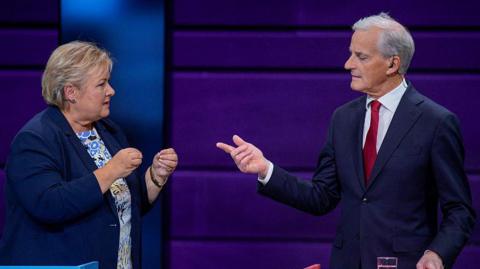One of the hot-button issues of the campaign has been the future of a 1% wealth tax, which Norwegians pay if their assets add up to more than 1.76m Norwegian kroner (£130,000; $175,000), although there are discounts that cover three-quarters of the value of your main home.
Hundreds of wealthy Norwegians have already left the country for Switzerland in recent years, anecdotally because of their native country's high taxes.
Can that exodus be reversed?
Sylvi Listhaug has called for the abolition of the wealth tax and cutting other taxes too, while Solberg's conservatives want to remove the wealth tax on what they call "working capital", such as shares.
Labour refuses to go that far but has promised a wide-ranging review of taxation. It has heavyweight former Nato chief Jens Stoltenberg in charge of finance and he warns against creating a tax system that means the wealthiest in Norway end up paying little or no tax.
Opinion polls ahead of the vote have put Labour in the lead, ahead of Listhaug's Progress party and the conservatives, and buoyed partly by the "Stoltenberg effect".
But if the combined forces of the centre right win, one of the big questions of this election is which of the two party leaders would be prime minister.
Solberg, 67, who was prime minister for eight years, has so far refused to accept the idea that her populist rival could take office ahead of her, suggesting that voters see her as too polarising as a politician.


